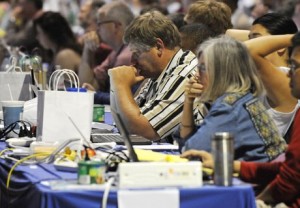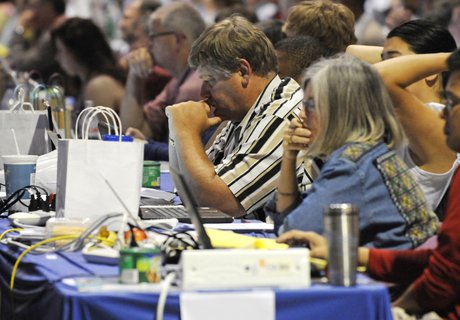Financial Stewardship in the Midst of Recession

See Carol Howard Merritt’s Essay, “Each Gave According to Their Need”
See Teresa Chávez Sauceda’s Essay, “Financial Stewardship and Recession”
What does faithful stewardship look like in a time of economic crisis and membership loss?
The earth is the Lord’s and all that live in it,
The world and those who live in it. Psalms 24:1
At the Presbyterian Church (U.S.A.) General Assembly meeting this summer, commissioners and committee leadership were given their marching orders: they were to practice “stewardship”. In an era of denominational decline in membership and revenues, with General Assembly Mission Council plans already in place for smaller budgets next year and yet smaller the next, “stewardship” at this General Assembly turned out to mean “restraint”. Committee leadership and commissioners were asked to be “responsible”, which meant that any new initiatives that came before them were to be scrutinized closely and advocates questioned with diligence about the true need for such a program – because the budget had already been set, and the experts had already reported what the PC(USA) could hope to raise in the years to come. One result was that the General Assembly complied, in large part, with their instructions. The General Assembly Mission Council has been directed to amend the budget in order to incorporate the newly-funded programs, so they can practice “stewardship” too.
This raises a number of questions.
What is the call of God to the PC(USA), and to other denominations facing similar challenges? What does faithful stewardship look like, in a time of economic crisis and membership loss? Is this the time that God is calling us to be smaller – to be a mustard seed body, growing to be a shrub but not a great tree?
Perhaps. But perhaps, instead, God is calling communions to open hearts and minds to new visions that God has already fashioned, to new things God calls us to perceive (Isaiah 43:19). The form or forms this newness takes is not clear – but demographic realities and projections in the US may hold some clues. Presbyterians have largely not been very effective in reaching out to folks who are different than the norm – which is to say that more than 90% of the membership is still white, despite initiatives to evangelize and start new churches. Communions need to discern not only to whom God is calling them, including new people and communities that have not been reached before. There also is learning possible about ways of talking about giving, and culturally-coherent understandings of financial support that are different in different communities. God is equipping us for the future; part of the responsibility of faithful stewardship is discerning what new tools God is fashioning for the new thing God is doing before us.
What does “church” mean to people today, and how is that affecting giving?
Another possible answer is found in a shift in the understanding of what “church” means for many people. It is often heard that people are not giving less money to the church – in fact, the claim is made that people are actually giving more than ever. But more of it is held at home. The times we live in have been called “post-denominational” by more than a few – and new church developments often do not include the name of the parent denomination on the sign out front. Much of this is well-documented by research, sociological, ecclesiological, and demographic. There is serious work to be done in this area. Again, the call of God comes into the conversation and takes a central role. In shifting times, what remains constant and absolute? What can move and change? What are we called to let go, and what new things are we called to open ourselves to? In a time of change and transition, disciplines that work toward health and wholeness in mind, body and spirit can help us keep balanced and aware of the ways God is moving.
What risks are we willing to take in order to faithfully proclaim God’s glory and Jesus’ love?
Finally, in the midst of this transition, some questions are not being addressed. Some things cannot be done by the congregation that is independent and interested in only those mission initiatives that can be seen, touched, and engaged up-close and personal. Different communions have approached the reality that there is less money in a host of ways; many have cut significant numbers of staff. If we are going through the kind of transformation/reformation that some suggest, the tectonic shifts we have experienced probably will not settle soon. A lot of work needs to be done to understand what “church”, the ekklesia from which this site takes its name, means in this era of change. What answers are available from new immigrant Christian communities? What ideas do the host of organizations operating under the “emergent church” label have? What can young people offer to the conversation? What do racial-ethnic congregations know that the rest of us need to learn? One General Assembly action provides a case in point of the problem we face. Committee discussion showed both that there are ideas out there, and the power fear of declining funding has to stop support of these ideas. Formation of a task force to study alternative understandings and methods of mission funding was recommended; the committee voted and the Assembly approved not formation of a task force but simple consultation between GA committees and agencies. The reason? The task force would have cost money. Responsible stewardship includes discerning all the resources available, and putting each one to good use. This will take willingness to risk – a key component of strong communities that are able to face challenges and grow. Our God risks disappointment every day by being unfailingly faithful to oft-faithless, fumbling humanity and church. How can we as a communion overcome our fearful risk-aversion, even in this moment of decline and transition, that we may appropriately proclaim God’s glory and Jesus’ love?
Ultimately, I do not believe that faithfulness leads to an understanding of “responsible stewardship”, which means “not spending any more money” – or, “spending less money this year, and even less the year after that”. As a parish pastor serving small congregations, the claim that “God has given us every gift necessary to do the ministry to which God is calling us” was a mantra for me. I still believe in its truth. If this is true, the money necessary, and the other resources necessary, will be made available to us at the appropriate moment. Being responsible stewards requires taking the risk to believe unswervingly in the faithfulness and providence of God, who gives us the opportunity to see and experience new mercies every morning and to find the insight necessary to the challenges of each day. If we can find the strength to take this risk, I believe we will find that there is, in fact, no risk in believing that God will provide. May we find the courage to take that leap.
On Wednesday, Carol Howard Merritt and Teresa Chavez Sauceda join the conversation.
See Carol Howard Merritt’s Essay, “Each Gave According to Their Need”
See Teresa Chávez Sauceda’s Essay, “Financial Stewardship and Recession”


Pingback: Tweets that mention Financial Stewardship in the Midst of Recession | Ecclesio.com -- Topsy.com